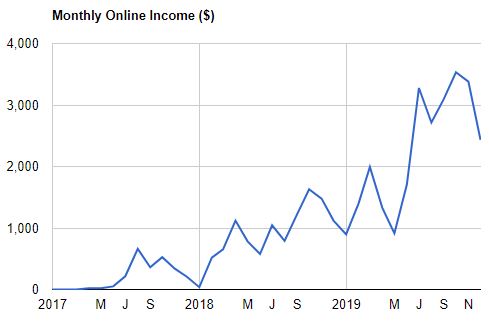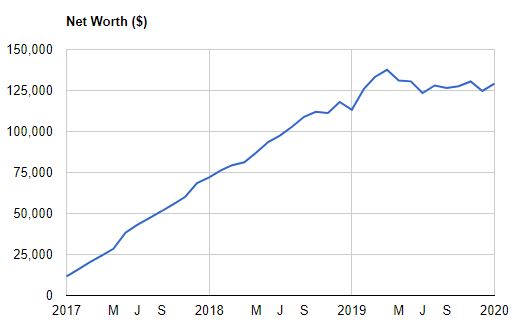
5 min read
A little over six months ago I quit my day job as a data scientist.
I made this decision because:
- I strongly disliked working in a corporate environment. The open office layout, the unproductive meetings, the traffic-laden commute, the subtle politics, the terrible bosses, etc. I disliked it all.
- I had enough money saved up to at least attempt to be a solopreneur. When I quit my job, I had around $120k spread out across different retirement accounts, brokerage accounts, and savings accounts that I could rely on for several months or even years if I was unable to generate enough income to pay the bills.
- I had no family to support. This meant that my expenses would never be this low again in my life, so it made sense financially to pursue entrepreneurship while I could still live fairly cheap.
I’m happy to share that in the six months since quitting my day job, I’ve been doing just fine financially. For those who don’t know, I currently own five different websites (including this one) that all generate income through ads, affiliate links, or my own products I’ve created. And I openly share my monthly income and net worth on this page for anyone interested in keeping tabs on my financial situation.
Since quitting my day job in July 2019, I’ve been able to boost my online income to around $3,000 per month, which is enough to cover my typical $2,000 monthly expenses.

As a result, my net worth has also stayed mostly flat over the last six months, which is something I’m also happy about:

I’m happy with the progress I’ve made so far, but I’d like to push my monthly income closer to $5,000 by the end of 2020 and eventually to $10k per month in the 1-2 years that follow.
Pros & Cons of Quitting My Day Job
Quitting my job has come with the following benefits:
- More freedom over my time. I can work whenever I want, wherever I want, for as long as I want. I can also run errands during the day while most of the world is working and I have the luxury of skipping out on a commute twice daily.
- More freedom over my mind. When I’m done working for the day, I don’t have to worry about receiving a call or text from a boss or coworker asking me about some project.
- More energy. When I’m tired of working, I simply take a break, go for a walk, or call it a day. This is in direct contrast with Corporate America where, if I was tired of working at 2 PM, I still had to stare at a computer screen and pretend to be productive for three more hours.
- More peace. In general, I’ve noticed that I have more peace in my life now. I don’t spend time complaining about my job to my girlfriend or my friends. I don’t spend time thinking about dumb office politics over the weekend. I don’t stress about upcoming deadlines. I simply feel more peaceful.
I can only think of one drawback to quitting my job: no more salary. I can no longer count on receiving a specific amount of money deposited into my bank account every two weeks by an employer. This has had some interesting effects on both my daily actions and my thoughts about income in general.
Thought #1: A Salary is Addicting
Nassim Nicholas Taleb once said:
“The three most harmful addictions are heroin, carbohydrates, and a monthly salary.”
A salary is addicting because once you start receiving it every two weeks, you become dependent on it. You slowly adjust your lifestyle to accommodate the amount of money you know will be hitting your bank account on specific dates.
And the longer you have a salary, the crazier the idea of working for yourself becomes since it inherently means you won’t earn a specific amount of money at specific intervals. The thought of receiving a lumpy income each month, even if it’s equivalent to the amount of income you could earn from a salary over the course of a year, is frightening.
I suspect that the lumpy, unpredictable income that naturally comes with entrepreneurship is one of the biggest reasons that most people choose to stay in a salaried position. And truthfully, for people who have a family and kids to support, I can’t blame them for wanting a stable, predictable income.
Thought #2: A Salary Removes You From the Point of Sale
For most people who earn a salary, they aren’t in a position where their actions directly affect the income of a business. Instead, they’re a step or two removed.
For example, suppose you work at the IT help desk at a large company. Your job is important – you need to help people in the company fix any laptop, Wi-Fi, access issues they’re having, which affects their productivity, which ultimately effects the bottom line of the company. But the work you do doesn’t directly affect the income that the company will generate that month.
This isn’t the case for an entrepreneur. Anyone who works for themselves knows that nearly every action they take on a daily basis has a direct impact on how much income they’ll earn in the near future. Whether it’s building a product, selling a course, writing an article, creating ads, doing taxes, etc. everything that you do directly affects the amount of money you’ll earn.
As an entrepreneur, income is always on the front of your mind. Because of this, you’re forced to only spend time doing things that increase your income.
This is perhaps the biggest change that I’ve had to embrace since quitting my day job – when I’m working, I am truly working. I’m not wasting time on Reddit, Hacker News, or any other forums just hoping for the time to pass quicker. I’m not wasting time taking unnecessary bathroom breaks just because I’m tired of sitting in an open office staring at a screen.
Each morning I’m doing three to four hours of deep work at a coffee shop with my headphones in making real progress on one of my websites.
Thought #3: A Salary Can Breed Complacency
During the first few months at my previous day job, I was determined to become a productive employee and add real value to the business. Unfortunately, I realized over time that the quality of my work wasn’t directly tied to my earnings.
Sure, I could do an excellent job on several projects and receive a small pay increase or a bonus, but there were plenty of times during my stint in Corporate America where my salary or bonus was directly affected by poor quarters or years for the company.
If the company had a pathetic year, my pay increase and bonus was negatively affected, even if I had done outstanding work. Because of this, I noticed that I had become more complacent because I knew that the quality of my work wasn’t directly related to my compensation. The incentive to do good work was tarnished.
I recognize that some companies are better than others at directly rewarding good employees with promotions and bonuses, but unfortunately this isn’t the case everywhere.
Thought #4: A Salary Offers High Income with Low Growth
The biggest perk of being an employee is that you can earn a salary that is much higher than the amount of income you could generate as an entrepreneur, at least starting out.
For example, as a data scientist I made about $7,000 per month (before taxes) before I quit. Now, as an entrepreneur in the early stages I make about half that amount.
The difference, of course, is that my salary growth over time would likely be 3-5% per year while my income growth as an entrepreneur has no upper limit.
In 2017, I started earning income online for the first time and made around $5,000. In 2018, I made around $10,000. In 2019, I made around $25,000. In 2020 I expect to make close to $50,000. This means that each year my online income has doubled, which blows the income growth of a typical 9-5 job out of the water.
Essentially, I traded a high-income, low-growth job for a low-income, high-growth position as a solopreneur.
Thought #5: A Salary Doesn’t Offer the Potential of Recurring Income
Lastly, while a salary can offer high compensation for your time, it can’t offer you recurring compensation. When you work eight hours in an office, you get paid for those eight hours. If you work zero hours, you get paid zero dollars.
Conversely, as an entrepreneur you can create things one time and get paid over and over again. The prime example for anyone who runs a website is writing articles. If you write an SEO-optimized article that shows up on the front page of Google, you can earn recurring revenue from that article every single day without additional work.
Create once, get paid repeatedly. This is the greatest advantage that solopreneurship offers over a salaried position.
Conclusion
I’ll be the first to acknowledge that quitting a day job and pursuing entrepreneurship isn’t right for everyone. For many people, it makes sense to earn a salary at a traditional 9-5 job. But for those who are willing to take the leap and forfeit a salary, they open themselves up to the potential upsides:
- Complete freedom over your work.
- Crazy income growth potential.
- Potential to get paid over and over again for your work.
These perks don’t always come immediately and they certainly aren’t guaranteed, but without taking any risk there is no reward.
- The Ad Revenue Grid - August 6, 2021
- Attract Money by Creating Value for a Specific Audience - July 13, 2021
- The 5-Hour Workday - March 26, 2021
Full Disclosure: Nothing on this site should ever be considered to be advice, research or an invitation to buy or sell any securities, please see my Terms & Conditions page for a full disclaimer.
